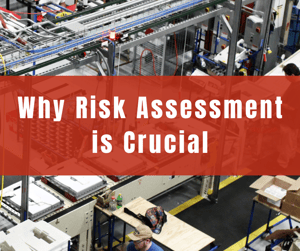-1.png?width=300&name=Copy%20of%20ACD%20Image%20(6)-1.png) Because of the rigorous nature of the work and the heavy machinery involved, factories and manufacturing plants can often be dangerous working environments. Therefore, risk assessments - commonly known as the foundation of making a machine safer - are necessary to curb potential hazards. A risk assessment is a logical, step by step breakdown of a machines’ processes, separating all the individual hazards so as to be able to focus on one at a time. As the industry continues to grow and more machines enter the work environment, risk assessments are critical to quell potential hazards and keep workers safe.
Because of the rigorous nature of the work and the heavy machinery involved, factories and manufacturing plants can often be dangerous working environments. Therefore, risk assessments - commonly known as the foundation of making a machine safer - are necessary to curb potential hazards. A risk assessment is a logical, step by step breakdown of a machines’ processes, separating all the individual hazards so as to be able to focus on one at a time. As the industry continues to grow and more machines enter the work environment, risk assessments are critical to quell potential hazards and keep workers safe.
Risk Assessment - The Process
Certain steps must be taken in order to fully assess the safety of a machine. These steps include:
- Identifying machine tasks and the possible hazards associated with them in the workplace.
- Assessing the probability and severity of potential harm.
- Minimizing the risk of harm through the elimination of the hazard or through the use of safeguarding techniques.
- Documenting the process and the associated data.
While the completion of a risk assessment cannot ever guarantee safety with a 100% certainty, it certainly helps to mitigate and prevent future potential hazards from occurring.
Who’s Responsible?
While risk assessments are critical toward maintaining a safe working environment and a myriad of organizations (OSHA, IEC, ISO) outline standards for conducting risk assessments, the responsibility of conducting a risk assessment falls to both the machine supplier and user. A competent third-party consultant can be hired to conduct a risk assessment. However, the eventual onus for personnel safety lies with the employer.
When Should We Conduct a Risk Assessment?
A risk assessment should be carried out whenever changes are made - whether significant or seemingly insignificant. The introduction of new machinery or systems and/or the implementation of new tasks and routines necessitates a risk assessment be conducted to ensure safety. When adding new processes, it is important to evaluate if any tasks could possibly result in a hazardous event.
Interested in learning more, connect with a GCG expert!


